In a sunny hospital room in the German university town of Würzburg one recent afternoon, Dr. Kathleen Wermke positioned her microphone next to the tiny red face of a 4-day-old named Joris. As Joris’s mother, Judith Fricke, began changing his diaper, the baby wriggled, stretched and opened his eyes.
“Joris,” Dr. Wermke cooed. “Do you want to say something?”
He didn’t appear to at first. But eventually, Joris let out a few snorts that built up to a disgruntled cry. This was the moment Dr. Wermke, a biologist and medical anthropologist who studies babies’ first sounds, had been waiting for. She made a recording for later analysis in her lab, Würzburg University Clinic’s Center for Pre-Speech Development and Developmental Disorders. But even without the aid of computerized tools, Dr. Wermke could make out a distinctive pattern in Joris’s wail.
“He really cried in German just now, right?” she said, smiling as she packed up her equipment.




